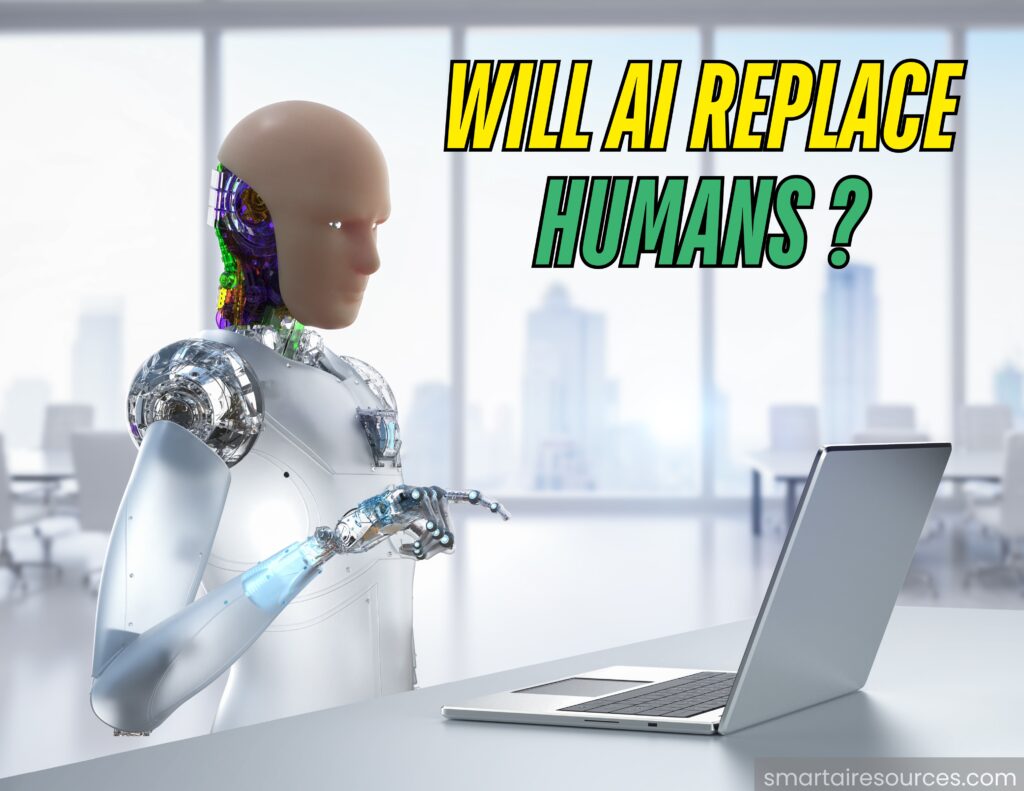
Introduction
Over the past few years, artificial intelligence (AI) has advanced dramatically, with generative AI setting the standard for producing material that resembles that of a person. Generative AI is pushing the limits of creativity and technology in a variety of ways, from creating lifelike voices and visuals to authoring poetry and music. But as this technology develops, a significant query comes up: Will generative AI eventually supplant humans?visit our website to get in-depth AI art creation tutorials.
The capabilities of generative AI, its ethical ramifications, and whether it threatens human jobs and creativity will all be covered in this article. We’ll also talk about how AI can be used as a potent tool to support people in a variety of fields rather than take their place.
What is Generative AI?
A class of artificial intelligence models known as “generative AI” is made to produce new content using data that already exists. Generative AI uses deep learning models to identify patterns and produce unique text, images, music, and even voices that sound human, in contrast to traditional AI, which adheres to preset rules.
Some of the most well-known applications of generative AI include:
- Text Generation: AI models like ChatGPT can write essays, poems, and articles that resemble human writing.
- Image Creation: Tools like MidJourney and DALL-E generate stunning visuals based on text prompts.
- Music Composition: AI can compose original music by analyzing past compositions and replicating styles.
- Voice Synthesis: AI-powered voice cloning tools can replicate human voices with remarkable accuracy.
While these advancements are exciting, they also raise concerns about AI’s role in society, particularly in the job market and creative industries.
How Generative AI is Changing the Workforce
AI and Automation: Replacing or Assisting?
The idea that AI could replace humans has long been a source of worry. The labor market has always been disrupted by technological advancements, from the Industrial Revolution to the invention of computers. Ultimately, however, technology has usually created more jobs than it has destroyed.
Generative AI is no exception. While some jobs may become obsolete, AI is primarily designed to assist rather than replace humans. Here’s how:
- Enhancing Productivity: AI allows professionals to complete tasks faster, reducing mundane work and enabling them to focus on higher-level creativity.
- New Job Opportunities: AI has led to the rise of new roles, such as AI ethics consultants, prompt engineers, and AI trainers.
- Augmenting Creativity: Rather than replacing artists and writers, AI provides tools that help them explore new ideas and expand their creative potential.
While AI is taking over repetitive tasks, it struggles to match human intuition, emotional intelligence, and ethical decision-making.
Ethical Concerns: The Need for Control and Regulation
Why Must We Control AI Training Data?
One of the most critical ethical concerns surrounding generative AI is the data it is trained on. AI learns from vast datasets, but without proper regulation, it can be misused. Some of the risks include:
- Deepfake Scams: AI-generated voices and images have been used to create fake videos and impersonate public figures.
- Plagiarism and Copyright Infringement: AI-generated content may replicate copyrighted material without proper attribution.
- Bias and Misinformation: AI can perpetuate biases and spread false information if not trained properly.
To prevent these issues, strict regulations and ethical guidelines must be enforced to ensure AI is used responsibly. This includes transparency in AI training data and granting individuals control over their digital likeness.
Will Generative AI Replace Human Creativity?
A common concern is whether AI will surpass human creativity and render artists, writers, and musicians obsolete. While AI can generate impressive content, it lacks the depth of human emotion and personal experience that define true creativity.
AI as a Creative Partner, Not a Replacement
Generative AI should be viewed as a creative assistant rather than a competitor. Here’s why human creativity remains irreplaceable:
- Emotional Depth: AI lacks emotions, making it unable to produce art or literature with genuine emotional depth.
- Innovation: AI generates content based on existing patterns but struggles to introduce truly original ideas.
- Cultural and Ethical Awareness: Humans understand cultural nuances and ethical considerations in ways that AI cannot.
Many professionals are already integrating AI into their creative processes, using it to brainstorm ideas, refine drafts, and speed up workflows rather than replace their artistry.
AI in the Voice Industry: Empowering, Not Replacing
One field that has seen significant AI integration is voice technology. Companies like Respeacher specialize in AI-generated voice synthesis, helping voice actors extend their reach without replacing them.
How AI is Benefiting Voice Actors
- Scalability: Voice actors can license their voices and work on multiple projects simultaneously.
- Preserving Legacy Voices: AI can recreate the voices of actors who have passed away for historical or cinematic purposes.
- Improved Accessibility: AI-generated voices help people with speech impairments communicate more effectively.
The Importance of Ethical AI Use in Voice Technology
To prevent misuse, voice actors must have control over how their voices are used. Ethical AI companies ensure that voice data is protected and not used without the actor’s consent.
Jobs AI is Likely to Impact
While AI is unlikely to replace humans entirely, certain jobs are more susceptible to automation. Here’s a look at which jobs are most and least affected by AI.
| Highly Affected Jobs | Least Affected Jobs |
|---|---|
| Data Entry Clerks | Healthcare Professionals |
| Telemarketers | Teachers & Educators |
| Basic Graphic Design | Psychologists & Counselors |
| Simple Content Writing | Creative Directors |
| Routine Administrative Work | Social Workers |
While AI can handle repetitive tasks, human-centric jobs that require empathy, creativity, and decision-making will remain secure.
The Future of AI and Human Collaboration
The future of AI is not about replacement but collaboration. AI will continue to evolve as a powerful tool that enhances human capabilities. By leveraging AI responsibly, we can unlock greater efficiency, innovation, and accessibility across industries.
Steps Towards Ethical AI Development
- Regulations & Policies: Governments and organizations must establish ethical guidelines for AI use.
- Transparency: AI companies should disclose how their models are trained and ensure accountability.
- Education & Reskilling: As AI transforms industries, reskilling workers will be crucial to maintaining job security.
Conclusion: AI as a Tool, Not a Threat
Will humans be replaced by generative AI, then? In the near future, the answer is most likely no. Even while AI is revolutionizing our work and creative processes, it is ultimately a tool to support and empower people, not to take their place. AI has the potential to completely transform industries while preserving human creativity, ethics, and control at its core—that is, if it is developed and applied responsibly. Rather than fearing AI, we should embrace its possibilities and learn to work alongside it for a better, more innovative future. What are your thoughts on generative AI? Tell us in the comments below!
